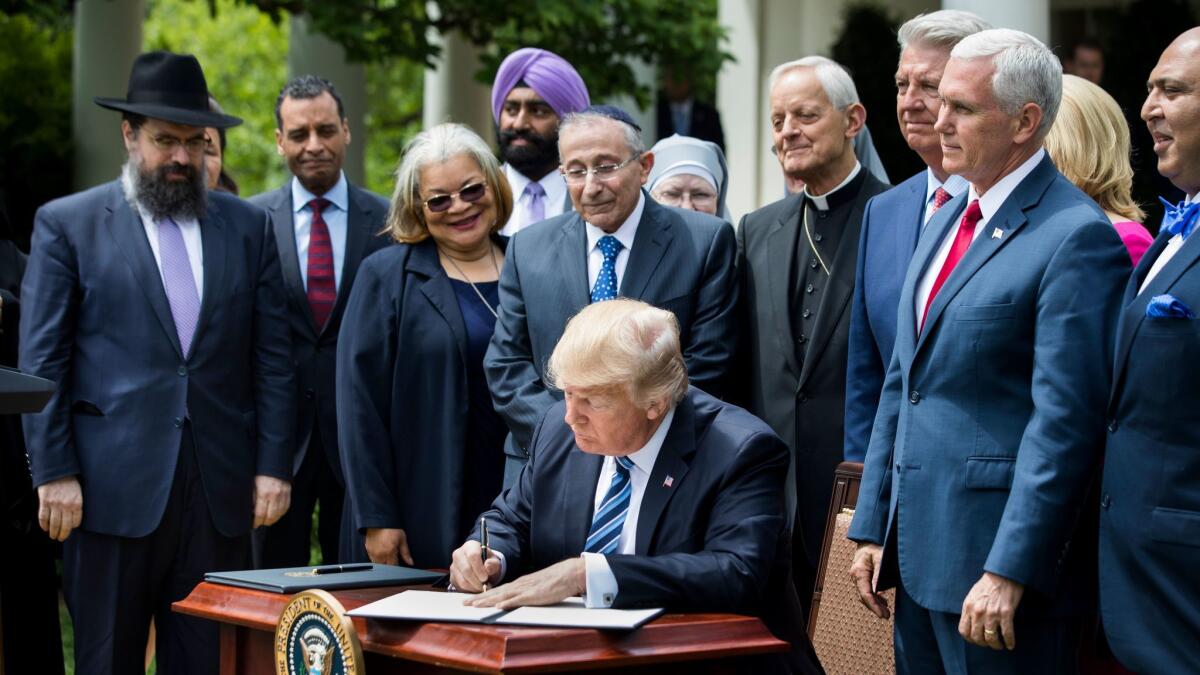Editorial: Don’t weaken the ban on politics in the pulpit

One of President Trump’s favorite bad ideas — making it easier for churches to endorse political candidates — is back. Among several so-called policy riders that Republicans hope to smuggle into an omnibus spending bill is a measure that would weaken the Johnson Amendment, which has been part of the Internal Revenue Code for more than 60 years.
Trump has said that he would like to “totally destroy” the amendment, which prohibits not only religious organizations but other nonprofits from participating in any political campaign on behalf of, or in opposition to, a candidate. “You’ve been silenced,” Trump told an audience of pastors in 2016, but he promised that “we’re going to get your voice back.”
Actually, the Johnson Amendment doesn’t prevent churches from speaking about a wide array of political issues, and members of the clergy are even free to endorse candidates so long as they do so as individuals and not, for instance, from the pulpit as representatives of their church. Churches aren’t free as institutions to back or oppose candidates, but that’s a fair tradeoff for the financial benefits they receive from tax-exempt status.
Last year, with great fanfare, Trump unveiled an executive order that he told religious leaders would allow them to “say what you want to say.” In fact, the order simply directed the Internal Revenue Service to evaluate political expression by religious nonprofits using the same criteria it employs for judging expression by nonreligious tax-exempt groups. True repeal or relaxation of the Johnson Amendment requires congressional action.
And that’s just what some Republicans in Congress would like to do using the stealth tactic of attaching a rider to a spending bill. One proposal would require consent by the IRS commissioner for each investigation of violations by a religious organization of the Johnson Amendment and notification to two congressional committees before an investigation could commence. That could make IRS officials even less likely to pursue violations of the Johnson Amendment than they are now.
Repealing or neutering the Johnson Amendment would have been wrong at any time since its enactment. But it would be especially dangerous in the post-Citizens United environment in which churches identified with particular candidates could be turned into the religious equivalent of a political action committee, using contributions from the faithful to amplify the candidates’ message at church functions.
The Johnson Amendment proposal isn’t the only possible rider that would make it harder to police the role of money in politics. Another would block any requirement that companies with federal contracts disclose their political spending and a third would increase the amount of money political parties could spend on candidates, undermining individual contribution limits. Additional riders would extend restrictions in previous bills, including one that prevents the Internal Revenue Service from adopting new limitations on political activity by so-called social welfare groups that aren’t required to disclose their donors.
Sneaking major policy decisions into spending bills is always a bad policy. But these riders are especially offensive. Congress needs to excise them.
Follow the Opinion section on Twitter @latimesopinionand Facebook.
More to Read
A cure for the common opinion
Get thought-provoking perspectives with our weekly newsletter.
You may occasionally receive promotional content from the Los Angeles Times.






